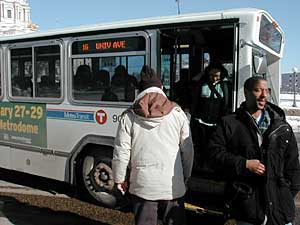|
Audio
Photos
Resources
Your Voice
|
Pawlenty urges bus drivers and Met Council to keep talking
March 2, 2004
 |
| Metro Transit bus riders will need to find other means of transportation as of early Thursday morning, when bus drivers plan to go on strike. (MPR file photo) |
Minneapolis, Minn. — Pawlenty says the main stumbling block is the cost of health benefits for retired drivers in the future. He says it's an overly generous benefit that creates a future bill the Met Council can't afford to pay.
"We don't want to reduce or cut off retiree health care benefits for the current employees. But it is true that they are eligible for those benefits if they work somewhere between 10 and 17 years, depending on when they started. That's really generous, and it exceeds what almost everybody gets in the private sector -- and what almost everybody gets even in the public sector," Pawlenty says.
 | |||
But the governor says he'll work to bring both sides together before the 2 a.m. strike deadline.
"We don't want a strike. This would be so disruptive to so many Minnesotans who need the buses to get to work and to other things," Pawlenty says. "And if there's any reasonable solution to get it solved by (the deadline), we'll give it a try."
Pawlenty says he blames previous Met Council administrators -- not the union -- for negotiating the retiree benefit plan. Union leaders say the Met Council's contract offer on health benefits is too expensive for the workers.
Ron Lloyd, president of the Amalgamated Transit Union Local 1005 apologized to riders who rely on buses to get to their jobs, schools and doctors' appointments. He says the union backed off some on binding arbitration over the contentious issue of retiree benefits, and offered to add one year to the current contract, as a means to avoid the strike. Lloyd says the Metropolitan Council rebuffed the offers.
|
They are eligible for (retiree health care) benefits if they work somewhere between 10 and 17 years, depending on when they started. That's really generous, and it exceeds what almost everybody gets" in the private and public sectors.
- Gov. Tim Pawlenty |
"When we made the offer for arbitration and to continue the existing contract, they made no offer except to say 'no,'" Lloyd said.
Lloyd says what the Met Council proposal takes money out of drivers' pockets.
"I know money's tight. However, our members cannot subsidize transit," Lloyd said. "Transit funding should come out of the Capitol. It should come out of the Legislature. We're stuck holding the bag with the council saying they have no money."
After 11 years on the job, driver Dan Obramowicz is now eligible for health benefit coverage if he retires. Under the Met Council's final offer, he would have to work another 15 years to be eligible. He calls the offer a broken promise, and he's resolved to stay off the job until the union makes its point.
"As long as it takes. Until we get an offer we can live with. That's all we wanted from the start," Obromowicz said.
Obramowicz says the strike was a difficult decision -- balancing the needs of riders against the best interests of employees. More than 90 percent of the union membership voted two weeks ago to authorize a strike.
Union officials say they picked Thursday to give bus riders enough warning and to allow seniors who receive monthly social security checks to get to grocery stores.
Metropolitan Council leaders appear just as determined in their position that their final offer is generous and competitive. Council Chairman Peter Bell disputes the union's claims, saying negotiators never got a clear answer on the manner of arbitration the two sides should enter.
"No one wins in a strike. It's like a marriage that fails where everyone feels bad about it," Bell said. "I think this is not a good thing for the Met Council, it's not a good thing for the union. I think it is not a good thing for the region. And perhaps most importantly it's not a good thing for the 220,000 rides we give on the MTC every day."
 | |||
Bell calls the strike decision "disappointing." But he says on health benefits, the Met Council cannot sustain the current level of coverage for employees.
"It's 16 percent of our operating budget now and that figure -- if it goes unchecked -- it would reach 27 percent by 2010," Bell said. "In essence it is the Pac Man in our budget, and is eating us alive."
Bell says the Met Council has a $255 million deficit projected in the fund it pays into to cover health benefits for retired workers.
The most recent transit strike in 1995 ended only after Gov. Arne Carlson brought the two sides together.
Most commuters take the bus to downtown Minneapolis and St. Paul and the University of Minnesota. Minneapolis is offering free parking in city ramps for carpoolers with at least five riders.
|
News Headlines
|
Related Subjects
|
